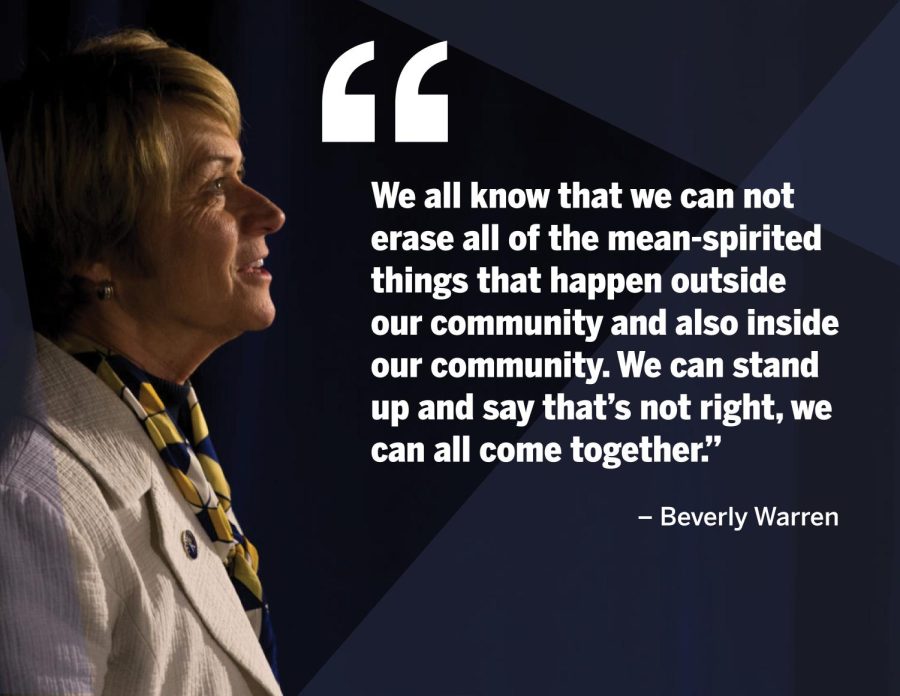University climate survey results spark call for action on Kent campus
January 25, 2017
Kent State held an event outlining the results of the Spring 2016 climate study Monday evening.The 104 question survey, conducted over a two-week period last March on the university’s main campus, included 6,867 respondents — 21 percent of the university community. This number included students, faculty and staff.
President Beverly Warren highlighted the purpose of the climate survey, saying it was, “so that we can learn more about who we are as a university.”
She said she hoped that as the university community is thinking through the results of the survey, that “we remember what our work here is all about … shaping, molding and committing to what I’m calling a caring culture, a culture of care.”
Warren sent an email to the university body Wednesday, January 25 highlighting the results of the study and offering a glimpse at what action the university plans to take.
Published with help from consultants led by Sue Rankin of Rankin & Associates Consulting, the climate study helped illustrate the areas in which the university thrives and lacks when it comes to diversity, inclusion and comfort on campus.
The results of the survey were presented by Emil Cunningham, a New York native and member of Rankin & Associates Consulting. He explained the importance of transparency and student affairs.
Using knowledge accumulated through his personal experiences, perceptions and institutional efforts, he said “we’re not here to only talk about the good things that are going on. It’s important to understand where you need to grow from.”
The survey touched on the campus climate at the university’s main campus specifically. According to Cunningham’s presentation, “current attitudes, behaviors and standards and practices of employees and students of an institution.”
Student activism was cited as playing a major role in the climate in 2016, with students demanding their personal experiences be used as guidelines of university policy.
The statistics showed that 30 percent of total respondents seriously considered leaving Kent State due to its challenging climate. Also, of the total number of respondents, 33 percent who identify as being a part of the queer spectrum and 38 percent who identify as transgender, have seriously considered leaving Kent State due to its challenging climate.
A total of 1,150 respondents reported they had experienced exclusionary conduct in 2016, most often through being shunned, ignored, intimidated or treated with offensive attitudes and hostility.
This attitude didn’t only apply to students, however: Of the non-tenure track faculty respondents, only 38 percent felt that their tenured and tenure-track colleagues understood the nature of their work.
In addition, of the 42 percent of trans spectrum respondents who experienced exclusionary conduct, 58 percent felt excluded specifically because of their gender identity. In addition to this, nearly 12 percent of 564 black and Latino respondents felt excluded or shunned because of their ethnicity.
Warren also introduced plans on jump starting a unity initiative at Kent State.
“As we move forward in the spring, we are going to engage in cultural competency training,” she said. “It’s time we all begin to learn about one another’s culture and one another’s perceptions and how one another feels in this environment.”
Other alarming statistics come from areas of mental health and unwanted sexual contact.
Out of 726 respondents that had conditions influencing their ability, just over 41 percent said mental health conditions impact this. These include their learning, working or living activities. These results are influencing future plans at the university, which Warren hinted at.
“We are creating a great place initiative. We want Kent State to be this great place to learn, to work and to live,” she said.
There were 290 respondents — 4 percent — who reported unwanted sexual contact; 42.6 percent of which happened during their first semester on campus. Following these events of unwanted sexual contact, 32 percent did nothing, while 21 percent didn’t report it because of the explicit fear their complaint wouldn’t be taken seriously.
Warren concluded the evening with a call to action, saying “We have to give you voice, and I hope you feel that. That we will listen, I will listen. But it won’t happen overnight, we’ve got to get this right together … We all know that we can not erase all of the mean spirited things that happen outside our community and also inside our community. We can stand up and say that’s not right, we can all come together.”
The results of the survey and the presentations displaying results of the Kent State aggregate report, Kent State campus report and regional campus reports can be found at http://www.kent.edu/voices.
Caelin Mills is the politics reporter, contact her at [email protected].












